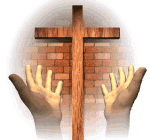
PCC Meeting Tues 27th July 7.00pm
Communion Thurs 29th July 10.00am
Communion Sun 1st Aug 9.30am
Reflections
In our own time, we know that a lot of food gets wasted. People are encouraged to buy more than they really need or can even use. Supermarkets have to throw away edible food too, because it is past its “best before” date. In earlier days it seems that people were better at using what they already had and making it last. At the College of the Resurrection, Mirfield, where I trained for the priesthood, unfinished meals, such as stew, would sometimes re-emerge as, for instance, soup. It was quite impressive how it all got used.
Looking at the passage from St John’s gospel today, it seems that Jesus was good at making food stretch. One of his disciples, Philip, could see that two hundred denarii would not go very far with a large crown of people. Another of his disciples, Andrew, said to Jesus that there he had only found a small boy who had five barley loaves and two fish. It would not go very far between five thousand people.
This sign that is given to us in John’s gospel is sometimes explained away by saying that in fact people probably had food that they had kept to themselves and that Jesus inspired them to be generous. Well, no doubt Jesus did inspire many people to go beyond their normal boundaries. This has been called the “nice thinking” interpretation. It would be good to think that a huge crowd of people could find it in themselves to share all that they had for the good of others. The reality is that many have very little and the ones who have more than enough all too often want to keep it to themselves.
No, there is more to this gospel passage than a message of innate human goodness. We are told that Jesus wanted to test Philip when he asked him where enough food could be found to feed the multitude. This feeding of the multitude also followed on from the accounts of how Jesus brought healing and peace to people in need. What we see here is a sign of the true nature of Jesus. We see the presence of God transforming what the earth produces and what human beings have to share. We see the power of God at work among us, meeting the hungry, the sick and the sinful in their time of need.
The feeding of the multitude, above all, points us to the Eucharist, the sacred meal that Jesus would share with his disciples and that he gave us as a memorial of his Passion and the sacrament of his living presence. The gospel tells us today how Jesus took the loaves, blessed them, broke them and shared them. This follows the pattern of the Eucharist: take, bless, break and give. Jesus is not just sharing earthly bread, but he is sharing himself, his very own life, with us.
Afterwards, Jesus tells his disciples: “Pick up the pieces left over, so that nothing gets wasted.” There is nothing wasted in God’s provision. This is true of the people of God – the Body of Christ. We may often feel that we have little to offer, just as St Andrew had wondered whether five barley loaves and two fish were worth throwing into the mix. But nothing is wasted or overlooked. It was not that the people on the hillside had enough to feed themselves, but that Jesus took what modest amount they had to offer and then provided for everyone’s needs.
In the Eucharist our spiritual hunger is satisfied by the real presence of Christ among us, bringing healing, peace, hope and courage into our lives. The living word of God and the sharing of the sacrament remind us of our common humanity and our unity in Christ. We are reminded that those around us are our brothers and sisters. This surely transforms the way we see the world and other people. We cannot feed a hungry world alone, but together with the Lord whose presence we share, each one of us can play our part in bringing whatever gifts we have to offer.



 RSS Feed
RSS Feed